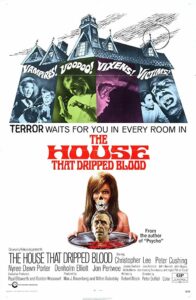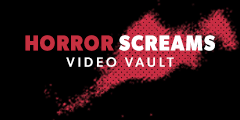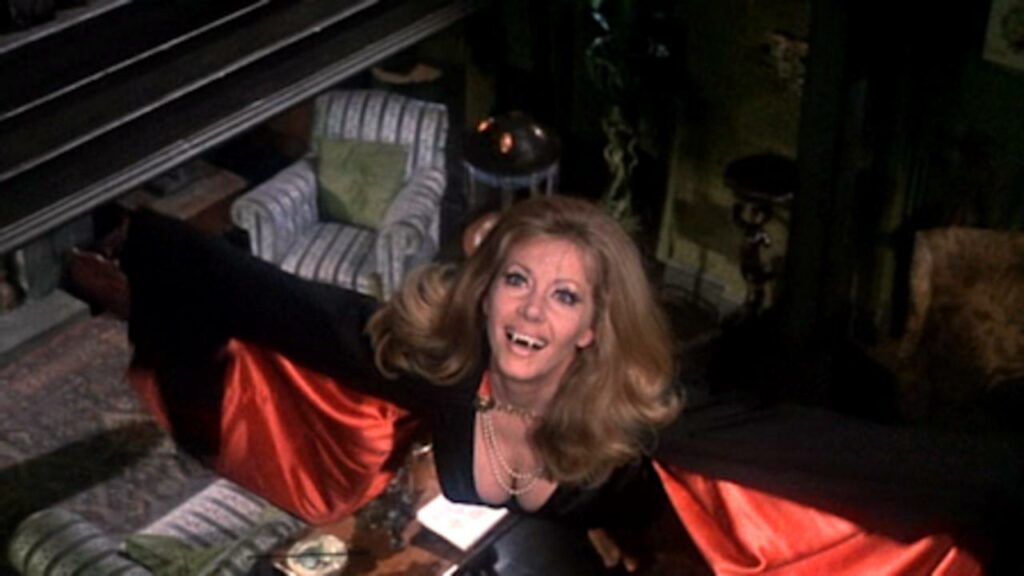THE HOUSE THAT DRIPPED BLOOD **** UK 1971 Dir: Peter Duffell. 97 mins
 Despite the title (director Duffell favoured DEATH AND THE MAIDEN), this is an unfashionably bloodless 1970 horror film and also one of Amicus’ best anthologies. Robert Bloch’s script is ripe with self-referential humour, beginning with the framing story in which an estate agent named Mr. Stoker (John Bryans) sets up the four tales to come as he recalls the horrors that befell past tenants of an isolated old country house. “Method For Murder” is an EC Comics-style twisting mystery suggesting Bloch had the same professional fears and hang-ups Stephen King would later express in novels like “The Dark Half”. Denholm Elliott is typically great as a horror writer menaced by his own creation, “Dominic” – a maniacally laughing asylum escapee. “Waxworks” is the only disappointment, a thin yarn with a weak punchline in which retired stockbroker Peter Cushing becomes obsessed by the wax effigy of a murderess. Cushing’s old sparring partner Christopher Lee is cleverly cast in the subtle, chilling “Sweets To The Sweet” – riffing on and undermining his screen persona as the strict dad of the seemingly sweet Chloe Franks. The ultimate reveal makes Lee the vulnerable one living in abject terror, reduced to a cowering victim for the marvellously sour final scene.
Despite the title (director Duffell favoured DEATH AND THE MAIDEN), this is an unfashionably bloodless 1970 horror film and also one of Amicus’ best anthologies. Robert Bloch’s script is ripe with self-referential humour, beginning with the framing story in which an estate agent named Mr. Stoker (John Bryans) sets up the four tales to come as he recalls the horrors that befell past tenants of an isolated old country house. “Method For Murder” is an EC Comics-style twisting mystery suggesting Bloch had the same professional fears and hang-ups Stephen King would later express in novels like “The Dark Half”. Denholm Elliott is typically great as a horror writer menaced by his own creation, “Dominic” – a maniacally laughing asylum escapee. “Waxworks” is the only disappointment, a thin yarn with a weak punchline in which retired stockbroker Peter Cushing becomes obsessed by the wax effigy of a murderess. Cushing’s old sparring partner Christopher Lee is cleverly cast in the subtle, chilling “Sweets To The Sweet” – riffing on and undermining his screen persona as the strict dad of the seemingly sweet Chloe Franks. The ultimate reveal makes Lee the vulnerable one living in abject terror, reduced to a cowering victim for the marvellously sour final scene.
Lee would have been a shrewd casting choice in the last and best remembered story, “The Cloak” – a wonderful, gentle genre parody with a marvellous Jon Pertwee as a horror star who scoffs at the production design of his latest picture and looks down on modern horror films – noting how he loves Bela Lugosi’s DRACULA, “not the new one”(!) Working on “Curse of the Bloodsuckers” – starring Ingrid Pitt’s cleavage – Pertwee buys a 13 shilling cloak from cat-stroking costume shop proprietor Geoffrey Bayldon (in a great pastiche of Ernest Thesiger) and then turns into a vampire for real. “The Cloak” is a contender for Amicus’ greatest anthology segment, its charming punchline carrying over into the resolution of the linking story in which, adding to the overall sense of genre commentary, Bryans addresses the audience directly. Duffell makes the most of the central location and, as with all the Amicus portmanteau movies, an eclectic cast has fun with it.
Review by Steven West

